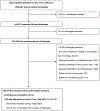Exposure to General Anesthesia for Cesarean Delivery and Odds of Severe Postpartum Depression Requiring Hospitalization
- PMID: 33079866
- PMCID: PMC9912141
- DOI: 10.1213/ANE.0000000000004663
Exposure to General Anesthesia for Cesarean Delivery and Odds of Severe Postpartum Depression Requiring Hospitalization
Abstract
Background: Previous research suggests that, compared with regional anesthesia, general anesthesia is associated with increased odds of postoperative depressive disorders. No study has specifically evaluated the possible protective effect of neuraxial anesthesia for cesarean delivery on maternal mental health compared with general anesthesia. This exploratory study was designed to test the hypothesis that general anesthesia for cesarean delivery is associated with increased odds of severe postpartum depression (PPD) requiring hospitalization compared with neuraxial anesthesia.
Methods: This retrospective cohort study included cesarean delivery cases performed in New York State hospitals between January 2006 and December 2013. Exclusion criteria were as follows: (1) having >1 cesarean delivery during the study period; (2) residing outside of New York State; (3) having a general anesthetic for other surgery or delivery in the previous year or in the year after the index case. The primary outcome was the occurrence of PPD, and the secondary outcomes were: (1) the composite of suicidal ideation or self-inflicted injury (ie, suicidality); (2) anxiety disorders; and (3) posttraumatic stress disorders (PTSD). Primary and secondary outcomes were identified during the delivery hospitalization and up to 1 year after delivery. Adjusted odds ratios (aORs) and 95% confidence interval (CI) of adverse psychiatric outcomes associated with general anesthesia were estimated using propensity score matching.
Results: Of the 428,204 cesarean delivery cases included, 34,356 had general anesthesia (8.0%). Severe PPD requiring hospitalization was recorded in 1158 women (2.7/1000; 95% CI, 2.5-2.9); of them, 60% were identified during readmission, with a median of 164 days after discharge. Relative to neuraxial anesthesia, general anesthesia in cesarean delivery was associated with a 54% increased odds of PPD (aOR, 1.54; 95% CI, 1.21-1.95) and a 91% increased odds of suicidal ideation or self-inflicted injury (aOR, 1.91; 95% CI, 1.12-3.25). There was insufficient evidence in these data that general anesthesia was associated with anxiety disorders (aOR, 1.37; 95% CI, 0.97-1.95) or PTSD (aOR, 1.50; 95% CI, 0.50-4.47).
Conclusions: General anesthesia for cesarean delivery is associated with increased odds of severe PPD requiring hospitalization, suicidal ideation, and self-inflicted injury. If confirmed, these preliminary findings underscore the need to avoid the use of general anesthesia for cesarean delivery whenever possible, and to provide mental health screening, counseling, and other follow-up services to obstetric patients exposed to general anesthesia.
Figures
Comment in
-
Missing Data and Imputation Methods.Anesth Analg. 2020 Nov;131(5):1419-1420. doi: 10.1213/ANE.0000000000005068. Anesth Analg. 2020. PMID: 33079865 Free PMC article. No abstract available.
-
Retrospective Data Can Be Misleading and Must Be Interpreted Cautiously.Anesth Analg. 2020 Dec;131(6):e248. doi: 10.1213/ANE.0000000000004799. Anesth Analg. 2020. PMID: 33196468 No abstract available.
-
In Response.Anesth Analg. 2020 Dec;131(6):e248-e249. doi: 10.1213/ANE.0000000000004800. Anesth Analg. 2020. PMID: 33196469 No abstract available.
-
Confounders Not General Anesthesia Likely Explain Greater Postpartum Depression.Anesth Analg. 2020 Dec;131(6):e248-e250. doi: 10.1213/ANE.0000000000004850. Anesth Analg. 2020. PMID: 33196470 No abstract available.
-
In Response.Anesth Analg. 2020 Dec;131(6):e250-e251. doi: 10.1213/ANE.0000000000004851. Anesth Analg. 2020. PMID: 33196471 No abstract available.
-
Obstetric Anesthesia and Depression: Data Granularity and the Risk of Confounders.Anesth Analg. 2020 Dec;131(6):e251-e253. doi: 10.1213/ANE.0000000000005116. Anesth Analg. 2020. PMID: 33196472 No abstract available.
-
In Response.Anesth Analg. 2020 Dec;131(6):e253-e254. doi: 10.1213/ANE.0000000000005117. Anesth Analg. 2020. PMID: 33196473 No abstract available.
References
-
- MMRCs. Report from nine maternal mortality review committees. Available at: https://stacks.cdc.gov/view/cdc/51660. Last accessed: October 23, 2019.
-
- Knight M, Bunch K, Tuffnell D, Jayakody H, Shakespeare J, Kotnis R, Kenyon S, Kurinczuk JJ, on behalf of MBRRACE-UK. Saving Lives, Improving Mothers’ Care - Lessons learned to inform maternity care from the UK and Ireland Confidential Enquiries into Maternal Deaths and Morbidity 2014-16: National Perinatal Epidemiology Unit, University of Oxford, 2018.
-
- ACOG. ACOG Committee Opinion No. 757: Screening for Perinatal Depression. Obstet Gynecol 2018;132:e208–e12. - PubMed


